
One of my favorite modern writers is Richard Rohr, a Franciscan friar who lives in New Mexico and writes things about religion and spirituality that many of us believe, but are too afraid to say out loud. (Here’s a taste.) I subscribe to his excellent newsletter, and he wrote something this week that I feel is important to pass on.
Titled “Some simple but urgent guidance to get us through these next months,” Rohr puts this difficult year in perspective, reminding us that humans have endured much more suffering in the past. After acknowledging that these next four months – leading up to the November U.S. elections and beyond – may hold even more suffering, he closes with two challenges:
Challenge 1: Limit the amount of news you consume across TV, social media, and internet news, hopefully to an hour per day or less;
Challenge 2: Use this time for some sort of public service, volunteerism, contemplation, or thoughtful reading.
I want to amplify this message. If we are to obtain “health, wealth, and happiness,” as I sign every newsletter, we can’t do it by doomscrolling negative news feeds in our dark basements. This clouds our vision, and it’s also a terrible way to live. We need to go on a “media diet,” and redirect our thoughts to higher things.
This is a radical idea, but I encourage you to try it. No more than an hour per day of news; instead, use this time for volunteer service, or giving back. Try meditation. (I meditate daily, as do some of the world’s most successful investors.) Or use this time to feed your mind with higher thoughts.
To that end, here is a new Blockchain Investor’s Reading List, made of inspiring books that will help you put things in perspective—and no matter what happens next, you’ll be a smarter, better investor.
The Reading List of the Blockchain Illuminati
You may not know there is kind of an underground reading list for leaders in the blockchain space: I’ve had blockchain luminaries like Changpeng Zhao, Chris Burniske, and Arianna Simpson recommend some of the books on this list. Feel free to dip into the ones that seem to be calling your name.
Title Amazon rating # of reviews
Economics in One Lesson 4.6 1600
Reinventing the Bazaar 4.5 50
The Intelligent Investor 4.5 11400
Berkshire Hathaway Letters to Shareholders
Technological Revolutions and Financial Capital 4.6 60
The Age of Gold 4.4 160
Principles: Life and Work 4.6 4700
Think and Grow Rich 4.7 26200
The Millionaire Next Door 4.6 4800
The Worldly Philosophers 4.6 350
Governance in Decentralized Networks
The Ascent of Money 4.5 800
Blockchain Success Stories
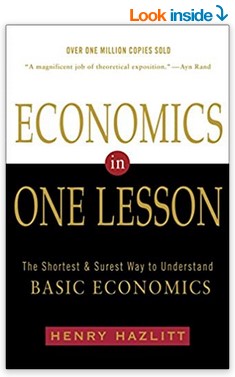 Economics in One Lesson: The Shortest and Surest Way to Understand Basic Economics by Henry Hazlitt
Economics in One Lesson: The Shortest and Surest Way to Understand Basic Economics by Henry Hazlitt
Amazon rating: 4.6 stars (1,600 reviews)
Hazlitt was a financial reporter for the Wall Street Journal and the New York Times who wrote this book (you might call it a manifesto) which explains the economic machine, while slashing through economic myths. Hazlitt writes in a clear, readable style, using simple stories and fables. First published in 1946, the book remains as relevant as ever in the light of today’s financial crisis.
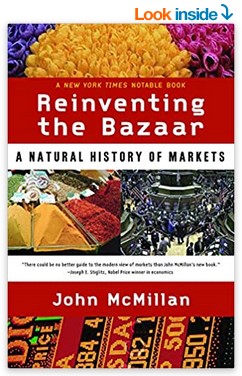 Reinventing the Bazaar: A Natural History of Markets by John McMillan
Reinventing the Bazaar: A Natural History of Markets by John McMillan
Amazon rating: 4.5 stars (50 ratings)
From investing in tokens to using digital exchanges, blockchains are deeply intertwined with markets. McMillan was an economics professor at Stanford University who wrote this book in the wake of the 2000 dot-com crash. For blockchain investors, this is an important book for understanding the five components of successful markets – and how to build better ones.
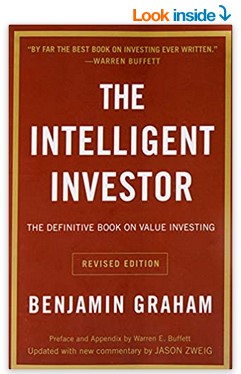 The Intelligent Investor: The Definitive Book on Value Investing by Benjamin Graham
The Intelligent Investor: The Definitive Book on Value Investing by Benjamin Graham
Amazon rating: 4.5 stars (11,400 ratings)
Perhaps you know that Ben Graham was the O.G. (original guru) who taught Warren Buffett how to invest (Buffett called it “By far the best book on investing ever written”). Graham’s ideas — investing in companies that provide real value, buying stocks on sale, and thinking long-term — are the bedrock principles we preach for blockchain investors today.
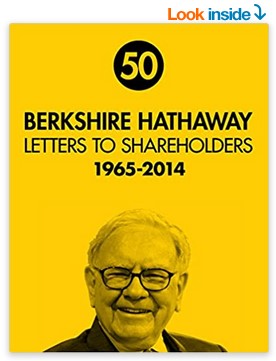 Berkshire Hathaway Letters to Shareholders by Warren Buffett
Berkshire Hathaway Letters to Shareholders by Warren Buffett
(Free to download!)
Speaking of Buffett, his annual letters to shareholders of his company are little pearls of investing wisdom. For me, the larger lesson is Buffett’s generosity in freely sharing this wisdom (how many other billionaires do this?). You don’t need to read these from the beginning; in fact, you may want to dip in and out of his most recent letters, which are relevant to today.
 Technological Revolutions and Financial Capital: The Dynamics of Bubbles and Golden Ages by Carlota Perez
Technological Revolutions and Financial Capital: The Dynamics of Bubbles and Golden Ages by Carlota Perez
Amazon rating: 4.6 stars (60 ratings)
This is an underground classic in the blockchain community, which is perhaps why Perez was a keynote speaker at this year’s Consensus conference (watch it here). She convincingly makes the case that technology and financial revolutions happen hand-in-hand – leading to the revolution happening today. The book is expensive and hard to find, but worth it.
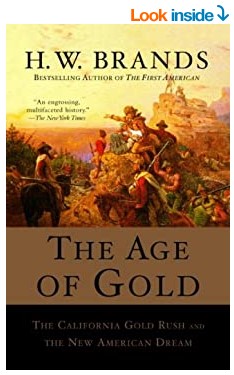 The Age of Gold: The California Gold Rush and the New American Dream by H.W. Brands
The Age of Gold: The California Gold Rush and the New American Dream by H.W. Brands
Amazon rating: 4.4 stars (160 ratings)
This isn’t just any history book: it’s a page-turning account of the California Gold Rush of 1849, packed with colorful characters, shady profiteers, and a few savvy miners who built dynastic wealth. Blockchain investors will see many parallels to our modern day “digital gold rush,” and learn excellent lessons for how to invest wisely when everyone else is losing their mind.
 Principles: Life and Work by Ray Dalio
Principles: Life and Work by Ray Dalio
Amazon rating: 4.6 stars (4,700 ratings)
Dalio’s firm Bridgewater Associates is the largest and best-performing hedge fund in the world, and this book outlines Dalio’s principles for success in both life and business. Originally circulated as a PDF that he shared with new employees, it’s now a #1 New York Times bestseller, an app, and a series of educational videos. (Dalio’s new book, The Changing World Order, is also required reading for investors.)
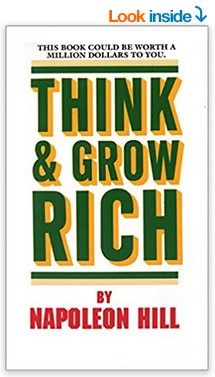 Think and Grow Rich by Napoleon Hill
Think and Grow Rich by Napoleon Hill
Amazon rating: 4.7 stars (26,200 ratings)
A self-help and personal development book, this little classic is probably the easiest read on the list. The story goes that Napoleon Hill was interviewing the great steel tycoon Andrew Carnegie, who offered to connect him with the world’s wealthiest people, if Hill would distill a formula to success. Whether or not the story is true, correct thinking – or mental mastery – is certainly a key to financial success.
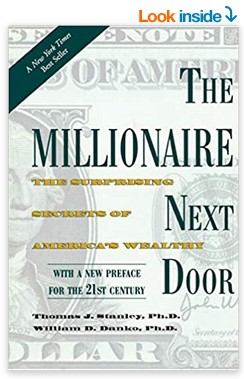 The Millionaire Next Door: The Surprising Secrets of America’s Wealthy by Thomas J. Stanley and William D. Danko
The Millionaire Next Door: The Surprising Secrets of America’s Wealthy by Thomas J. Stanley and William D. Danko
Amazon rating: 4.6 stars (4,800 ratings)
The premise of this book is that millionaires are everywhere (even next door), and they are quietly amassing wealth through basic financial principles. This book is the antidote to the Lambo-loving blockchain culture which rewards crazy risk-taking and showy excess. These are sound financial principles (entrepreneurship, frugality, hard work) shared by the truly rich … not the newly rich.
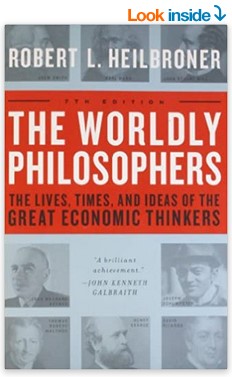 The Worldly Philosophers: The Lives, Times And Ideas Of The Great Economic Thinkers by Robert L. Heilbroner
The Worldly Philosophers: The Lives, Times And Ideas Of The Great Economic Thinkers by Robert L. Heilbroner
Amazon rating: 4.6 stars (350 ratings)
Contrary to popular belief, economics is not a science, but more like philosophy. That philosophy is shaped over the centuries by great thinkers who bring in radical ideas. From Adam Smith to Karl Marx, Heilbroner explains their ideas with great clarity and readable storytelling, with a chapter devoted to each. An excellent crash course on the history of economic thinking.
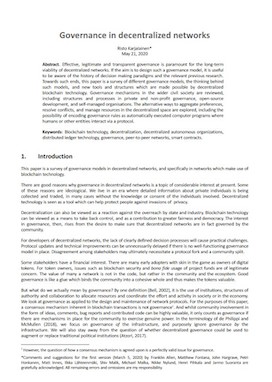 Governance in Decentralized Networks by Risto Karjalainen
Governance in Decentralized Networks by Risto Karjalainen
(Free to download!)
Even though blockchain technology is new, the way that we organize groups of humans to work together – known as governance – has been tried many different ways over the centuries. In this groundbreaking working paper, the founder of Streamr Network dives deep into the different models of governance, and how they apply to blockchain today. (This filled in so many gaps in my knowledge.)
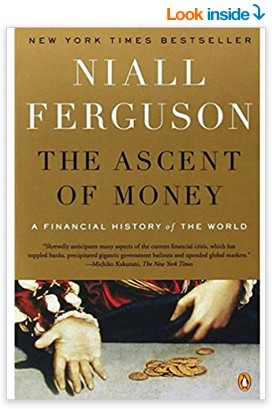 The Ascent of Money: A Financial History of the World by Niall Ferguson
The Ascent of Money: A Financial History of the World by Niall Ferguson
Amazon rating: 4.5 stars (800 ratings)
“The ascent of money has been one of the driving forces behind human progress.” So begins this book, where the award-winning historian Ferguson argues that money – far from being a “necessary evil” – has acted as a “coordinating mechanism” that lets the world prosper and thrive. In the 10th anniversary edition (linked above), he also includes a chapter on bitcoin and cryptocurrencies.
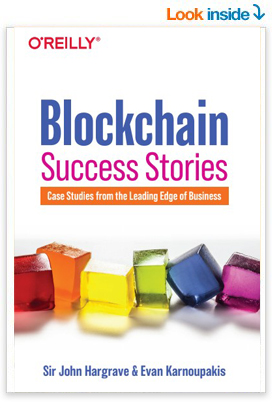 Blockchain Success Stories: Case Studies from the Leading Edge of Business by Sir John Hargrave and Evan Karnoupakis
Blockchain Success Stories: Case Studies from the Leading Edge of Business by Sir John Hargrave and Evan Karnoupakis
(Estimated release: October 22, 2020)
This is the book we wished we had when we started working in blockchain: simple, readable stories that showed how real people built real blockchain businesses: not theory, but practice! Deeply researched, packed with firsthand interviews, the book contains ten page-turning stories of today’s leading blockchain projects (Binance, Cardano, Circle), with best practices for entrepreneurs and investors.
See the Patterns, And You See the Possibilities
No matter what happens over the next four months (and beyond), these books will help you see the big patterns in financial markets throughout history. The “new” world of blockchain is not really new, just the newest form of patterns that have happened over and over again.
When you see the patterns, you see the possibilities. You begin to see when markets are likely to go up and when they’ll go down. You get better at recognizing the psychology of other investors. You improve your mental habits, and avoid getting sucked into FOMO or FUD.
These books, in short, make you a better investor.
Better yet, they teach you about human systems. Money is a human invention, and financial markets are just human systems. Even blockchain, with its emphasis on the laws of mathematics, is human in its design. By understanding humans, we are better able to understand their financial creations, and that is incredibly valuable. It’s like a secret weapon for investors.
The Four-Month Challenge
Over the next four months, then, I hope you’ll take up the gauntlet thrown down by Richard Rohr.
- Limit your news intake to an hour or less per day.
- Use the extra time for volunteering, public service, meditation, and/or reading.
You now have a reading list. The rest is up to you.
P.S. Don’t forget to sign up for our free weekly blockchain investing newsletter.

